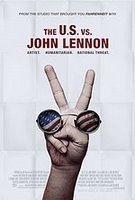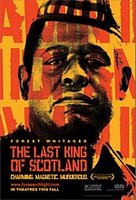THE U.S. VS JOHN LENNON
 Director: David Leaf & John Sheinfeld (TV documentary work)
Director: David Leaf & John Sheinfeld (TV documentary work)Starring: Documentary of John & Yoko Lennon and Nixon.
The United States versus John Lennon is not a very good movie. It's a solid TV documentary, but it's just not feature film quality. At its heart it exists to make aging baby boomers nostalgic for (what it suggests is) a more meaningful age, and well, to pointedly compare Nixon to Bush. The problem is that it doesn't even attempt to discern what the parallels between those two men might be much. The other problem is that it never digs deep. I'm not sure, but I might have seen every major bit of archival footage in this film on TV. This might be a good primer for a younger generation that isn't familiar with the Nixon years, but it's not a meaningful discussion of the subject.
Surprisingly, the first half of the film barely discusses John Lennon. For 45 minutes we get the cliff notes version of late 60s, early 70s America: The Summer of Love, Abbie Hoffman and the Chicago convention riots, Kent State shootings, Black Panther party.
The rest of the film then vaguely follows Lennon's fight to retain his US residency. At its heart, I think that the issue here was Nixon's mean-spirited soul. (I recommend Oliver Stone's masterpiece Nixon for some real insight into that tragic figure.) In this film we never even get a glimpse of insight into Nixon. In this film Nixon exists as a boogeyman against the ever-good John Lennon fighting for peace and love. Of course everyone knows it's more complicated than that. In some way, I'm afraid that by watering down the story, it makes it easier for some folks to disregard the crimes of our past. Nixon really was the closest thing to a tyrant America has experienced in 100 years. He actually argued in the supreme court that he had "all the powers of Louis XIV" for 4 years while in office. That's a terrifying argument. That's a terrifying thought process for a sitting president. This movie never touches on the real story, which is why Nixon believed such an insane thing. It's just "Nixon is bad, and Lennon is good. Oh, and Bush is bad". If you agree (like I very broadly do ...) than this film is a tolerable experience, but I can't claim it's a good movie in any way.
Standouts: Not much. Lennon's always interesting to listen to.
Blowouts: Not much. This film lived very much on the surface of the issues it covers. No depth.
Grade: C



